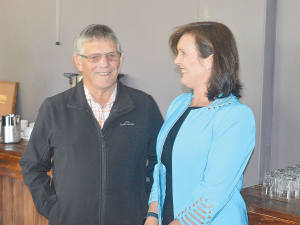Fonterra’s exit from Australia ‘a major event’
Fonterra’s impending exit from the Australian dairy industry is a major event but the story doesn’t change too much for farmers.
 Fonterra director Leonie Guiney chats with Fonterra shareholder Murray Marshall at the AGM last week in Methven.
Fonterra director Leonie Guiney chats with Fonterra shareholder Murray Marshall at the AGM last week in Methven.
The change in government following last month's general elections doesn't change the need for an on-farm emissions target, says Fonterra chair Peter McBride.
He told the co-operative's annual general meeting in Methven last week that the strongest motivating forces are offshore.
Farmers, who have faced an avalanche of regulations under the previous Labour Government, are expecting a more sympathetic hearing from the incoming government, likely made up of National, ACT and NZ First. Both National and ACT favour delaying the agriculture sector's entry to any emissions trading scheme.
But McBride hinted that farmers shouldn't expect a change in Fonterra's sustainability drive because of changes at the Beehive.
"I do want to be very clear with you that, respectfully, the need for an on-farm target does not change because of the general election," he says.
"The strongest motivating forces are offshore and, from my perspective, are both geopolitical and commercial in nature."
McBride says being a leader in sustainability is a fundamental part of the co-op's strategy.
He cautioned that sustainability and emissions are also the new trade barriers.
"We could essentially be locked out of some of our most valuable markets if we cannot demonstrate emissions reductions."
He noted that the EU is introducing a Carbon Border Adjustment Mechanism that applies carbon tax to certain products imported into the EU. The EU is also looking to impose carbon charges on transport of goods to market, levied on all large ship entering their ports.
The other main commercial driver is access to funding and capital - for both the co-op and individual farming businesses.
McBride says the main banks and financial institutions have set emissions reduction targets.
"Our on-farm emissions and the co-op's operating emissions are a large part of their Scope 3 emissions, which they are seeking to reduce."
Some Fonterra farmers could switch their supply to other processors if Scope 3 target becomes financially difficult to achieve.
McBride acknowledged that some Fonterra competitors may use this as a procurement tool in the short term.
"But the commercial reality of doing business at scale internationally will capture all of us in time. They will be late to the table, and presented with an even bigger elephant to eat."
Fonterra’s impending exit from the Australian dairy industry is a major event but the story doesn’t change too much for farmers.
Expect greater collaboration between Massey University’s school of Agriculture and Environment and Ireland’s leading agriculture university, the University College of Dublin (UCD), in the future.
A partnership between Torere Macadamias Ltd and the Riddet Institute aims to unlock value from macadamia nuts while growing the next generation of Māori agribusiness researchers.
A new partnership between Dairy Women’s Network (DWN) and NZAgbiz aims to make evidence-based calf rearing practices accessible to all farm teams.
Despite some trying circumstances recently, the cherry season looks set to emerge on top of things.
Changed logos on shirts otherwise it will be business as usual when Fonterra’s consumer and related businesses are expected to change hands next month.
OPINION: Fonterra may be on the verge of selling its consumer business in New Zealand, but the co-operative is not…
OPINION: What does the birth rate in China have to do with stock trading? Just ask a2 Milk Company.